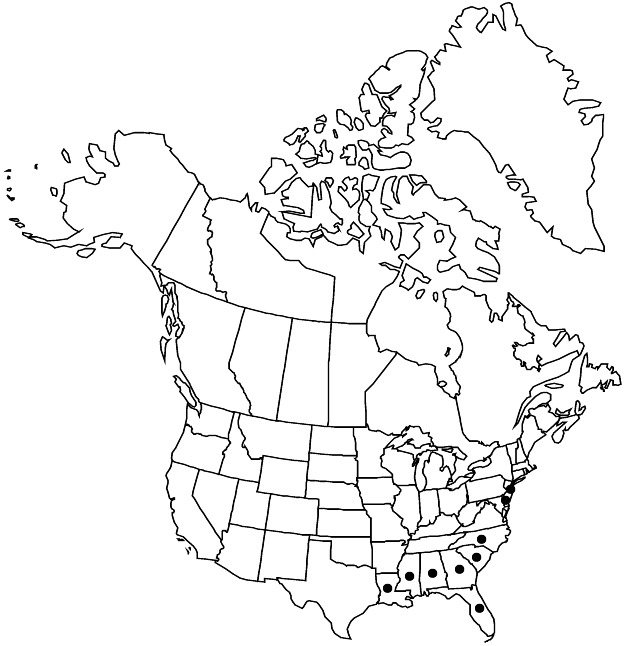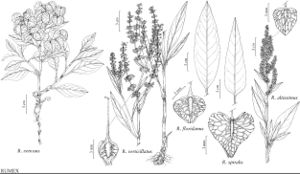Rumex floridanus
in A. P. de Candolle and A. L. P. P. de Candolle, Prodr. 14: 46. 1856.
Plants perennial, glabrous, with vertical rootstock. Stems erect, rarely ascending, especially axillary shoots, usually producing axillary shoots below 1st-order inflorescence, or at proximal nodes, 40–80(–120) cm. Leaf blades with lateral veins forming angle of 40–60° with midvein, lanceolate or broadly lanceolate, rarely ovate-lanceolate, 7–20(–30) × 3–5 cm, usually 3–5(–6) times as long as wide, normally rather fleshy, coriaceous or subcoriaceous when dry, base narrowly to broadly cuneate, margins entire, flat, apex acute or acuminate. Inflorescences terminal and axillary, terminal usually occupying distal 1/3–1/2 of stem, usually rather dense, interrupted only near base, narrowly to broadly paniculate. Pedicels articulated in proximal part, distinctly thickened distally, 7–15 mm, usually 2.5–3 times as long as inner tepals, articulation distinctly swollen. Flowers 10–20(–30) in whorls; inner tepals, broadly ovate-deltoid or deltoid, (3.5–)4–5.5 × 4–6 mm, usually as wide as or wider than long, base truncate, margins entire or, rarely, very indistinctly erose, apex acute or acuminate; tubercles 3, equal or subequal, often verrucose and/or transversely rugose (wrinkled) in proximal part. Achenes brown or dark brown, 2.5–3.5 × 2–3 mm. 2n = 60.
Phenology: Flowering late spring–early summer.
Habitat: Swamps, marshes, bogs, riverbanks, alluvial woods
Elevation: 0-200 m
Distribution

Ala., Del., Fla., Ga., La., Miss., N.J., N.C., S.C.
Discussion
Rumex floridanus is closely related to and sometimes treated as a subspecies of R. verticillatus. Distribution of R. floridanus is not known sufficiently because of frequent confusion with R. verticillatus. Moreover, the name was partly misapplied by W. D. Trelease (1892) to R. chrysocarpus.
Selected References
None.
